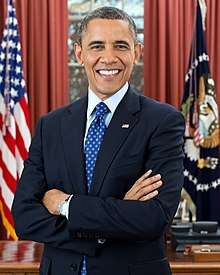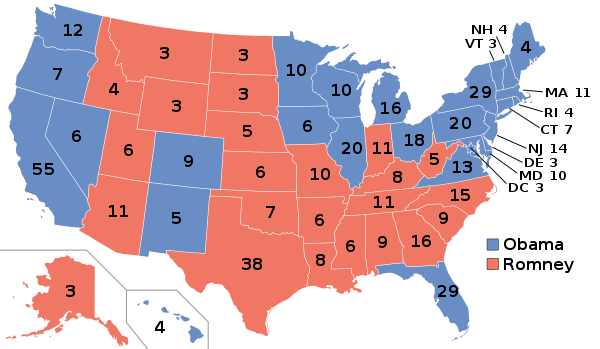The First
Obama won the office of the President on the 4th of November, 2008. He was sworn into office on January 20, 2009. He is the first African-American in the United States to be elected to the office. He was elected after serving part of his first term as a United States Senator.
Obama the Man

Barack Hussein Obama II (b.August 4, 1961) was the President of the United States from 2009 to 2017. He is the first African-American to serve as president. He was the junior senator of Illinois in 2005. He resigned on November 16, 2008, following his election to the presidency.
Early career
Obama was a graduate of the University of Columbia and Harvard, where he was president of the Harvard Law Review. Obama taught constitutional law at the University of Chicago from 1992 to 2004. He announced his candidacy for the senate of the United States in January 2003, gained a primary victory in March 2004, and was elected in November 2004. Obama provided orientation with national convention Democratic in July 2004. As a member of the Democratic minority in the 109th congress, he helped to create the legislation to order the conventional armaments and to support a greater public responsibility in use of the Funds Federal. He also made official trips in Europe, the Middle East, and in Africa. During the 110th congress, he helped to create the legislation relating to incentive and electoral fraud, climate change, nuclear terrorism, and the care for turned over military manpower of the United States.
Hobbies
It's no secret that Barack Obama is a very passionate sports fan and roots for the Chicago Bears, Bulls, Blackhawks, and White Sox. Obama is also a very avid basketball player and frequently plays competitive pickup games with his closest friends and advisors. Obama has a tradition on election day that he plays pickup games in whatever city he happens to be in.
Stimulus package
Obama's first job as President was to combat the recession that was occurring as he took office. His principal policy for this was the American Recovery and Reinvestment Act of 2009, commonly referred to as the "stimulus package". The act funded infrastructure improvements, cut some taxes, gave money to struggling schools, and expanded Medicaid. By mid-2009, the private sector started to experience job gains rather than losses, and the stock market began to surge. However, some sectors experienced little to no growth.
Obamacare
Obama and the Democratic majority in Congress spent much of 2009 debating a number of plans that would grant health insurance to all Americans while attempting to halt the steep rise in healthcare costs. The result was Obamacare, signed into law in early 2010 and rolled out in stages during the Obama administration. The linchpin of Obamacare was the individual mandate, requiring nearly all American citizens to buy health insurance if they did not receive it from their employer or qualified for Medicaid. It limited the ways insurers could deny coverage, in particular requiring that coverage not be discriminated due to patients having pre-existing conditions. It also enacted mechanisms to subsidize health care and established a network of exchanges to buy health insurance on.
Tea Party Controversy
During Obama's campaign and administration, there were unsubstantiated allegations that Barack Obama was not born in the United States. His certificate of live birth lists his birthplace as Hawaii[1], but a large cadre of Americans, including his successor Donald Trump, did not believe this. Other Americans believed an unsubstantiated claim that Obama was a Muslim. These "birthers" and "truthers" were part of largely-Republican movement that opposed Obama's policies, especially healthcare. This movement was known as the Tea Party movement. The Tea Party movement generally wanted smaller government, lower taxes, and less government controls, particularly on firearms. It received funding from conservative businesspeople, particularly the Koch Brothers. The Tea Party movement believed many conventional Republicans were not conservative enough, and took down a number of Republican leaders in primary elections. The enthusiasm of the Tea Party, coupled with malaise toward Obamacare, led to Republicans recapturing the House of Representatives in 2010.
Wars in Iraq and Afghanistan
Obama took office with the wars in Iraq and Afghanistan still raging. Though he significantly reduced troop levels, he did not completely withdraw from either country due to instability in those countries. Under Obama, the United States continued drone strikes in the Middle East.
Ten years after the terrorist attack that took place on September 11th, Pakistan officials gave President Obama a lead that Osama Bin Laden was hiding in a densely populated city in their country. On May 1st President Obama authorized a covert operation to terminate Osama Bin Laden and was successful.
LGBT rights

During the Obama Administration, several states legalized gay marriage at the state level, either at the ballot box on in the state house. Obama repealed the Don't Ask, Don't Tell rule in the military in 2010. Prior to the 2012 election, Obama became the first president to come out in favor of nationwide gay marriage. In 2015, the Supreme Court legalized gay marriage nationwide.
2012 election

Barack Obama was renominated by the Democrats. Seven people ran in the Republican primaries: Michele Bachmann, Newt Gingrich, Jon Huntsman, Ron Paul, Rick Perry, Mitt Romney and Rick Santorum. Other prominent Republicans, such as Sarah Palin and Chris Christie, did not run, while Herman Cain and Gary Johnson aborted their campaigns prior to the first primary votes.
Romney was the frontrunner through most of the primary cycle, though he split the first three states with Santorum and Gingrich. Bachmann, Huntsman and Perry dropped out of the race following poor showings in the early primaries. Romney had broad support from most of the Republican establishment, while Santorum started by running an Iowa-only campaign, later branching out to Christian conservatives in all states. Paul's support was primarily among libertarian and young Republicans, while Gingrich's support was concentrated in the Deep South. By the end of March, Romney had a large lead in delegates, with Santorum winning several states before dropping out. Gingrich did not actively campaign anywhere but Delaware after March, and dropped out after losing to Romney in Delaware. By late April, Romney had clinched the nomination.
The general election between Obama and Romney was expected to be very close. Ultimately, Obama won every state he won in 2008 except North Carolina and Indiana, and defeated Romney.
Debt ceiling debates and government shutdown
. The influence of the Tea Party and the debt ceiling crisis ultimately brought down the Speakership of John Boehner, and he was replaced by Paul Ryan, another Republican.
A Changing Country
As the United States entered the 21st century, it continued to experience demographic and economic changes. Two of these were the "browning" and "graying" of America: the average age of Americans continued to rise as the "Baby Boom" generation aged, while half of people born in the 1980s or later were non-white, many the children of immigrants from Mexico and other Latin American countries. The ageing of the American populace is one major contributing factor to the rise of the healthcare sector as a portion of the American economy. Fewer people were working in the manufacturing and mining sectors, with more working in the service sector or the temporary "gig economy". Technology continued its advances, with "smartphones" that had Internet capabilities becoming widespread by the mid-2010s.
Post-racial society...or not?
Many had hoped that the election of Obama would contribute to a society devoid of the racism that had always been part of the country's history. However, tensions between white, black and Latino Americans continued during the Obama administration.
References